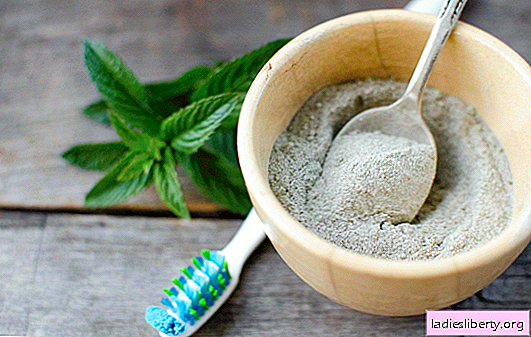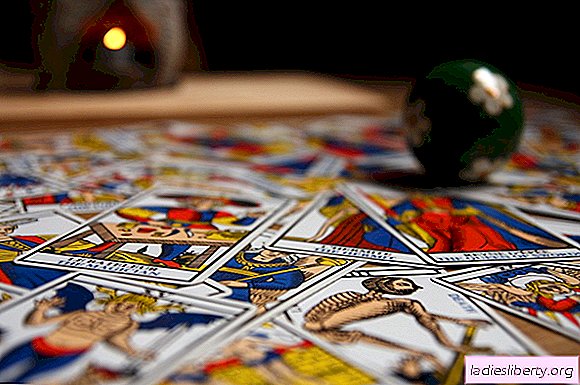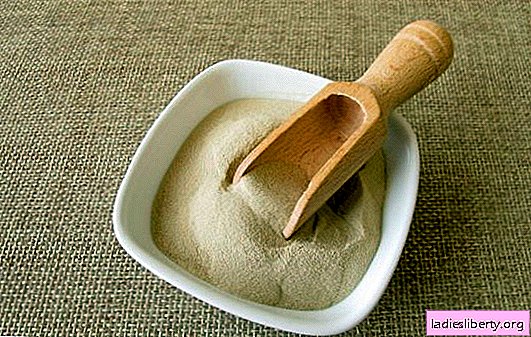
Tooth powder - a loose means for cleaning teeth, which has been used in everyday life for hundreds of years.
Since ancient times, people have understood that clean teeth will last longer and used all sorts of devices and compositions for this. Mixtures of shells and eggshells were prepared, bread crumbs and ground spices were added.
Tooth Powder Composition
Tooth powder is known for its abrasive (cleaning) properties and is recommended for a course of intensive cleansing and whitening of tooth enamel. The composition of the tooth powder contains powdered chalk or clay, to which sodium bicarbonate, various types of salt, essential oils, menthol and other additives are added to improve the taste.
• white clay exhibits more gentle abrasive properties, the powder mixes better with water and a pasty homogeneous solution is obtained.
• sodium bicarbonate - sodium bicarbonate NaHCO3, and simply baking soda, which helps to disinfect the oral cavity and whiten teeth;
• table or sea salt - has an antimicrobial effect, accelerates the regeneration of soft tissues;
• essential oils (anise, peppermint, clove, lemon, eucalyptus and others) - have an antiseptic effect, are used to prevent periodontal disease;
• extracts of spices and medicinal plants - reduce inflammation and bleeding of the gums, promote rapid healing.
Useful and harmful properties
The complex composition of tooth powder allows you to use it to clean your teeth and prevent certain diseases (gingivitis, periodontitis, stomatitis):
• a sufficiently high degree of abrasiveness - the powder removes plaque well, reduces the deposits of tartar and polishes the enamel, makes it smoother;
• exhibits a whitening effect, eliminates dark traces of tea, coffee and nicotine;
• disinfects the oral cavity, strengthens the gums, has an antibacterial and anti-inflammatory effect;
• contains natural ingredients, does not cause allergic reactions.
But there are some comments that limit the continued use of this tool:
• the specified abrasive properties with prolonged use of the powder can lead to excessive load on the enamel surface and weaken its protective qualities;
• this increases the sensitivity of the enamel to temperature changes, the teeth begin to respond to too hot or cold food;
• insufficient refreshing properties, as in toothpaste;
• violation of hygiene rules, because you have to dip a toothbrush into a common box;
• inconvenient dosage and method of application.
How to use tooth powder
When brushing your teeth, the brush is moistened with water and lowered into a package with tooth powder, or poured on top if it is in a jar with a dispenser. After that, brush your teeth in the usual way for 2-3 minutes and rinse your mouth with water or use a special dental rinse with healing components.
Dentists recommend using dental powder as a prophylactic against plaque and tartar not more than twice a week.
• You can apply a slurry of powder with water to darkened teeth and leave for 10-15 minutes, then rinse with warm water.
• Instead of water, for the preparation of cleaning products, you can use herbal products that are useful for caring for the oral cavity, for this you can use various herbs: ledum, marjoram, St. John's wort, calendula, chamomile, sage; it is very effective to add a decoction with oak bark.
• You can add 2-3 drops of antiseptic alcohol tincture with eucalyptus or echinacea.
Home use of tooth powder
The antibacterial properties of tooth powder are used to prepare cosmetic masks to eliminate inflammation and pimples. There are dozens of recipes with tooth powder that evens and dries the skin.
• Peeling with sea salt and soda: 1 tbsp. l tooth powder, 1 tbsp. l shallow sea salt, 1 tbsp. l soda, 2-3 tbsp. l water; mix everything and gently apply to the face, rinse immediately with warm water or leave for 10-12 minutes.
• Hydrogen Peroxide Cleansing Mask: 1 tbsp. l tooth powder, 1 tbsp. l hydrogen peroxide; mix, apply for 5-6 minutes, no longer, cleans clogged pores.
• Protein and Starch Tightening Mask: 1 tbsp. l tooth powder, 1 tbsp. l starch, 1 egg white; mix dry ingredients, beat egg white and add to the defect, apply for 15 minutes, rinse with warm water.
• Cosmetic Oil Mask: 1 tbsp. l tooth powder, 1 tbsp. l oils (linseed, hemp, sea-buckthorn, rosehip, any type of skin), you can add 2 drops of essential oil (cloves, bergamot, patchouli, tea tree); mix to a homogeneous consistency, apply on face and neck for 15-20 minutes, rinse, use regular basic products in half an hour.
The abrasive properties of the powder are useful for cleaning and polishing dishes and cutlery. Dilute the powder with water in a ratio of 2: 1 and grate the darkened trays, glasses, plates, spoons or forks, rinse, wipe dry. Silver products are cleaned in the same way, including silver jewelry.
A few more options for using tooth powder: wipe the “sole” of the iron, car headlights or the screen of a mobile phone so that they are clean and sparkling.
• Wipe a clean mirror in the bathroom with a small amount of diluted tooth powder - it will sparkle and will not “sweat” from fumes.
• Try tooth powder in the form of bleach for clothes, they can remove stains from coffee, lipstick and even hair dye.
• If you have dirty white sneakers or sneakers, then wipe them with an old toothbrush with diluted tooth powder - they just change and become like new.
• Tooth powder can be used to wash plaque from tiles or stains and wallpaper patterns if they are to be treated with detergents; faucets and baseboards in bathrooms and shower cabins are well washed.
• Dental powder can be used to gently clean the surface of a gas or electric stove and oven - apply diluted powder for 10-15 minutes and rinse with a cloth, then wipe with microfiber or cotton cloth.
• If you cut fish, onions or garlic and you need to quickly wash the cutting board and knives from the smell, then wipe them with tooth powder, as well, if necessary, wash off the pungent odor from your hands.
• After doing dirty work in a garage or housework, it is sometimes difficult to wash your hands with ordinary soap, then use tooth powder - it quickly removes adhering dirt and disinfects the skin.
• If you were bitten by mosquitoes or midges, but there was no special ointment for insect bites, then apply a little powder diluted with water and leave to dry.
• A powder mixture is also applied to spot burns and cuts, which protects the damaged area from infection.
As you can see, the beneficial properties of tooth powder can be used in many cases. It contains natural ingredients, does not cause allergies, cleans teeth and disinfects the oral cavity. It can be used for whitening teeth and for the prevention of inflammation, added to cosmetic masks to cleanse and brighten the skin.











